An Englishman Abroad |
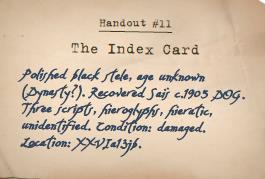 |
For the next several hours, Marcus and Jimmy pored over the Black Stone of Sais. Marcus made copious notes, took charcoal rubbings and began to compare them to Erlichmann's journal, while Jimmy meticulously photographed it from multiple angles. Both were hampered by a lack of the ability to read either Heiratic or Hieroglyphs, and their minimal grasp of the Atlantean language prevented much translation of that, but comparing patterns between the two sources it was soon obvious that Botho Erlichman had been right; the earlier translation by Burgdorf had been based on an incomplete rubbing of the Stone and contained some errors or omissions.
As a final check, and after making sure that there was no-one around to see him do it, the Professor made the Voorish Sign, glancing around generally as well as closely eyeing the Stone itself. The results were mixed. Many of the artefacts in the store-room had been used ritually for centuries, and traces of the flows of magic or faith that had once accompanied that lingered, though not in great strength. A couple of the items on one shelf hit his eyes like a shout of pain and distress, and a closer look showed them to be bronze sacrificial knives. The spiritual pain and darkness wrapped around them was too intense to experience for long and he looked hastily away. On the stone itself, he saw more flows of ancient energy - and a pattern, seeming to weave in and out of the writing below. He made a careful note of this symbol in his notes.
Meanwhile, Birapeer was wandering the exhibits upstairs, comparing the artefacts to the cultural remains of his own distant land. A small exhibit of hand weapons piqued his interest, and he leaned closer to examine them. The label described it as a metau, but it looked like nothing so much as a forked stick of some kind of wood with edges.
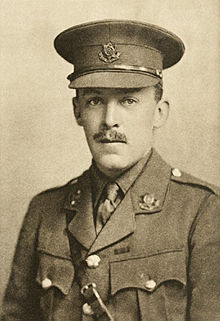 |
On completing their research, the three reported back to SIME where Lt.Col Maunsell updated them on what had transpired earlier that day, and made a car available to them to travel out to Makhren Jirma so as to catch up with the other agents. Marcus, unlike anyone else, passed back a summary of their encounters with "Weisemann and G". These names triggered great interest in the Intelligence officers, and after getting him to go into a great deal of detail, RJ explained that these two enemy agents were well-known to Allied Intelligence. They were probably in the country in order to prepare it for a possible German attack by a mixture of espionage and sabotage, and they were to be regarded as resourceful, dangerous and unpredictable. He cautioned the agents to be extremely careful tackling them, while noting that taking them out of the picture would be a very useful thing to achieve.
Shortly afterwards, their car was rattling off into the desert evening, heading for Makhren Jirma.
 |
On arrival at the site, Birapeer, Marcus and Jimmy were surprised to find the signs of more fighting with the Mi-Go. Two wrecked armoured Mi-Go were sprawled on the valley floor between the newly-established camp of the Royal Engineers and the ruins, and several scorch marks marred the ground nearby. More ominous, a newly-dug grave with a British infantry helmet was visible off to the eastern edge.
Cyril's hair was standing up in all directions, and Joe was nursing a minor bullet wound - as well as maintaining an almost feverish grip on his newly-acquired Bren gun. The others appeared unhurt.
Once the new arrivals had been brought up to speed on events, some serious thought was given to how the Mi-Go had managed to be above ground when - as far as was known - the complex was still sealed by the collapse.
Using torches, the agents began to scour the area for tracks. The spoor of the armoured monsters was pretty easy to find, but Anné remained convinced that she had seen - and shot at - a third shimmer. Sure enough, she picked up tracks similar to those Francoise and Birapeer had seen days before. These, though, were decorated with intermittent splatters of black ichor - Anné's hasty pistol shot had evidently struck home. Gathering the rest of the team, she set out to follow them. As a preliminary check, Marcus made the Voorish Sign once more over them, but picked up very minimal results; the Mi-Go appeared to be more of a technological than occult foe. As he turned to go, however, he noticed a group of the local workers watching him in utter terror. Now he came to think of it, he realized that all the natives he'd encountered in Cairo between the Museum, the hotel and SIME had avoided looking at or approaching him. "Sahir! Sahir!" he muttered wryly under his breath.
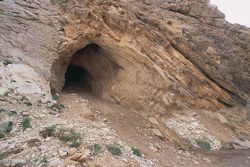 |
The trail led out of the valley and into the low hills to the west of the site, along a fairly straight path for fifteen or so minutes' worth of walking. Then they terminated at a cave entrance.
The agents glanced at each other with knowing looks, convinced that they had found a hidden entrance to the Mi-Go complex. However, after entering the cave with enormous care and many readied weapons, they realized that it was only fifty yards deep and almost completely empty. Multiple tracks showed that two armoured and one natural Mi-Go had been in and out several times. In one corner, they found a stack of the thin metal sheets covered in Mi-Go script, and in another a pile of pieces of metal, similar in design to the armoured parts of the Mi-Go walkers. Amongst those they found a cylinder, around the size of an artillery shell, with glazed panels on it which emitted a pale green glow. It also sported metal connectors, similar to those on the brain cylinders.
Collecting all these items, the agents scouted around the entrance to the cave and picked up more tracks with 'bloodstains' heading back towards the site. Following these, they headed up towards the hills to the south-east of the site, and soon found themselves approaching a ridge similar to the one they themselves had first scouted it from.
As they did so, Marcus Brody blinked and his stride faltered. That curious feeling we all get from time to time floated across his mind; what was I doing again? Then he shrugged, and continued. At the same moment, Birapeer, Joe and Anné crested the ridge and stopped - directly ahead of them, obviously in position to observe the site, was a Mi-Go in its' natural form. As they halted, it seemed to stagger sideways for a moment, in the manner of a being struck or stunned, and the humans did not fail to take advantage. "Bon voyage, bâtard!" snarled Anné for them all as she lifted her handgun
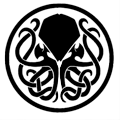 Keeper Note: The Mi-Go knew they were coming, and attempted to take over Marcus (again) as he'd been dominated before. His Resistance roll, though, was 01, which was enough to stun the already wounded Mi-Go and earn one surprise round. They didn't need another. Keeper Note: The Mi-Go knew they were coming, and attempted to take over Marcus (again) as he'd been dominated before. His Resistance roll, though, was 01, which was enough to stun the already wounded Mi-Go and earn one surprise round. They didn't need another. |
A massive barrage of small-arms fire erupted as the twitchy agents unloaded everything they had at the alien monstrosity. Two pistols and two Bren guns hammered bullets into it at a range of no more than thirty yards, and the fungoid creature simply disintegrated into a spray of ichor, chitin and body parts.
There was no need to check for life signs, though Joe did kick a couple of the larger pieces just in case.
 |
The next morning, as the regular crunch of the excavator resumed, Marcus returned to his studies, while Cyril went and examined the less-beaten-up of the two smashed Mi-Go armours. By some miracle of intuition he managed to trip the release and open the 'suit', revealing a now badly-decomposed corpse inside. Once that was scraped out, he examined the system itself. There was a space for the operating entity to occupy, but no apparent controls or viewports; whatever control was exerted looked to be mental. There was a sizable space within the armour that was not given over to the operator, presumably for the mechanisms.
Joe had obtained some bits of wire, a bulb and holder from one of the trucks, and proceeded to make a circuit with them to two of the terminals on the glowing cylinder. When he did so, there was a loud bang and hot bits of exploded bulb bounced off his face. The insulation was all melted off the wires, and only the rags he'd wrapped his hands in saved them from being badly burned. His guess was right; this was whatever 'battery' the armour used - and it produced far more power than he had expected.
Birapeer had scouted around again, and found something else new. Sometime in the last 36 hours, a car had driven up to within half a mile of the site, and two people had walked carefully from it to a vantage point over the site, remained there for a while, returned to the vehicle and left. Both sets of prints were from men, one very large, one undersized; he suspected he could put names to the owners of the shoes.
By the end of the day, Marcus was pretty sure he'd isolated the major error in the translation. Where Burgdorf had identified the location of the piece of the Palladion as Armarna, the revised version said something else - but so far, he was unable to translate it.
That night the agents themselves kept watch, in shifts of one civilian and one military. However, the only event was the sudden and startling appearance of a small and harmless jerboa.
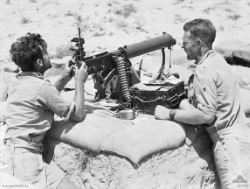 |
By nearly 2pm, the excavators were on the point of breaking through, and the agents and troops were gathered and prepared. Lethbridge-Stewart had emplaced his heavy weapons well - the Vickers machinegun covered the whole area and the mortar was behind the ruins with a good angle from cover to drop bombs into the portal chamber. British soldiers were spaced in good cover in a wide circle around the site, rifles and hand grenades ready to hand.
With a crunch and clatter of falling rock, the mechanical shovel broke through the roof of the portal chamber, and the vehicle was withdrawn, leaving a black opening the size of a car. Carefully, weapons readied, the agents moved forwards and peered inside. The purple illumination from the light globes was gone - as was all of the equipment - the consoles, the 'chairs', the smashed Augmented Mi-Go. Only the now empty frame of the Portal stood alone, now exposed to the sunlight.
Carefully, the agents entered the room and moved down the passage back towards the main corridor, stopping atop the scorchmark where Cyril had been drilled by the disintegration beam and nearly killed. Producing the light-globe they'd taken from the mine, they rolled it down the corridor, bumping and bouncing amongst the fallen chunks of rock until it stopped at the entrance to the room they'd not explored. The turning back towards the rest of the complex was, as expected, blocked by tons of fallen rock and earth.
Marcus nearly stopped everyone's heart by bawling out Douglas Mowell's name, hoping for a response from the brain in a cylinder despite the latter's precipitous descent into intractable madness the last time they'd seen him. There was only silence.
Cautiously, but suspecting that it wasn't needed, they reached the doorway and peered through. Another dark room around the same size as the portal room was revealed. This had not been stripped but had no Mi-Go occupants. It was lined with shelves on the western side, containing open and empty brain jars, and tall, faintly illuminated niches on the eastern side sealed with sheets of clear ‘glass’. In six of these were suspended naked human forms, motionless but undecayed. Marcus stared, then moved closer; one of them was Douglas Mowell. Each had a fine red line around the forehead, horribly suggesting blasphemous removal of their living brains. Marcus' face twisted with sadness at the reminder of his friend's horrible fate.
One of the niches had been cracked and obviously powered down by the explosion, and the body within was now a shrivelled and withered blackened thing. Cyril pulled his camera out and started taking photographs, while Joe headed back for the entrance to inform Lethbridge-Stewart that the coast was clear, and another funeral was needed.
The Saiyida Zeinab district of Cairo is named after the city’s patron saint, Zeinab (granddaughter of the prophet Mohammed) and lies just south of the main centre. Historically a working-class area, its inhabitants have long supported Egyptian independence and there are many important mosques and shrines within its boundaries.
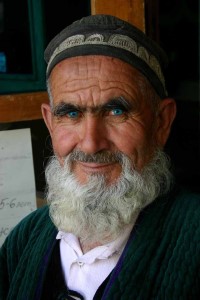 |
It seemed like an odd place to find a retired British Army Major but the district was, unusually enough, home to more than one; however, the only one of interest to the investigators was Major Aloysius Blythe-Manders, whose name was scribbled in amongst Dr. Ehrlichmann’s notes on Cairo. Lucien Kutay's directions led them there with no difficulty.
The house stood back from the street behind sheltering walls that protected both its gardens and its privacy; admittance was by a latticed wooden gate set deep into the thick outer wall. A metal bell-pull with a highly polished brass handle was affixed to the wall to the right of the gate, and pulling on it summoned a tiny, gnarled man with stunningly bright blue eyes: Sheikh Janin El-Rauf, the Major’s gardener and gatekeeper.
Marcus and Cyril launched into their pre-prepared account of how they'd been recommended to go see the Major by M. Kutay. El-Rauf waved these offerings aside, and carefully sized up each of the agents before chuckling unnervingly to himself and ushering them into the property, muttering something Arabic under his breath in an amused tone.
The house lay behind a small but well-tended garden that appeared to have a shrine nestled in one corner. The building’s exterior was barely any more decorated than the walls facing out onto the street, apart from one or two intricately carved blocks of stone. The sheikh escorted the investigators through the main door, into the airy and modestly decorated salamlik (greeting area) of the house, where the Major was happily puffing away on a sheesha pipe. He stood to greet his guests, warmly shaking hands with everyone before inviting them to join him. Refreshments to everyone's taste were rapidly produced by Sheikh Janin, and proved excellent.
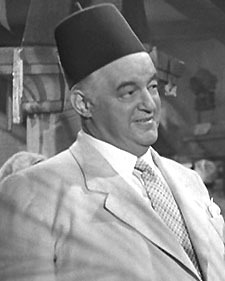 |
Rather portly, slightly florid, and just a touch vain, the old Major’s white hair and fine set of moustaches marked him out as both a military man and one who belonged to days past. His old uniform probably still hung in his wardrobe, but these days he prefered to dress in well-tailored, comfortable linen suits and one of a fine selection of silk cravats and matching handkerchiefs. His shoes also betrayed his military training and, despite the dusty environment, were buffed to an impressive shine.
 Keeper Note: Amenophis IV, better known as Akhenaten, began to build a new, monotheistic religion, much to the disgust and concern of the existing priesthoods. The pharaoh and his Queen Consort, Nerfertiti, moved their court to the new city of Akhetaten (“the horizon of the Aten”, now known as Amarna). Akhenaten attempted to purge the worship of the old gods, many of whom did not want to be displaced. Determined forces began to move against the new regime, eventually bringing about its downfall and erasure from the records. The Amarna Heresy was crushed and the old ways were restored. Keeper Note: Amenophis IV, better known as Akhenaten, began to build a new, monotheistic religion, much to the disgust and concern of the existing priesthoods. The pharaoh and his Queen Consort, Nerfertiti, moved their court to the new city of Akhetaten (“the horizon of the Aten”, now known as Amarna). Akhenaten attempted to purge the worship of the old gods, many of whom did not want to be displaced. Determined forces began to move against the new regime, eventually bringing about its downfall and erasure from the records. The Amarna Heresy was crushed and the old ways were restored. |
After some polite small talk, Marcus moved the conversation to the reason for their being there. Like M.Kutay, the Major was aware of the recent German expedition to Armarna, and lit up with interest when it was mentioned. Armarna - and Akhenaten - were his especial area of interest, it turned out, and he spoke wistfully of wishing he could return there to explore the place some more.
On realizing that his visitors had an interest in Armarna as well, the Major brightened enormously, and nothing would do but that he show them around his personal collection. As a guide he was excellent, educated and erudite but able to make his presentation interesting and educational to those not learned in Egyptology as well.
As they looked through the collection, Marcus noted that many of the items from Armana were decorated with an unusual and particular symbol for the Sun, one specific to Akhenaten and his Heresy.
 |
While he spoke, Anné quietly checked the statue where it sat in her miraculous handbag, but it was totally inert. So was Joe's blue pendant, and the orichalum paperweight.
Marcus took the pretext of visiting the house's (very modern) bathroom to slip out, where he quickly cast the Voorish Sign before coming back. Glancing around, he saw the usual faint flows of ancient ritual around the objects in the Major's collection, and no sign whatsoever of any trace of the occult associated with their host. The Sheikh, however, was a different matter. Through the lens of the spell, he was revealed to be a person of significant importance, very probably a mystic and a local holy man; and probably someone who could be trusted and relied upon.
Session Date: 19th June 2018 |